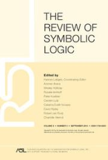
Review of Symbolic Logic
metrics 2024
Elevating Discourse in Symbolic Analysis
Introduction
Review of Symbolic Logic is a prestigious academic journal published by Cambridge University Press, dedicated to advancing the field of logic through critical analysis and innovative research. Established in 2008, the journal has become a key fixture in the academic community, particularly recognized for its contributions in the realms of logic, mathematics (miscellaneous), and philosophy. With an impressive classification of Q1 across multiple categories in 2023, it ranks within the top echelons of its field, standing at 15th out of 41 in Logic and 29th out of 90 in miscellaneous mathematics, positioning itself as essential reading for scholars and practitioners alike. Although not Open Access, the journal offers robust access options through institutional subscriptions, providing an expansive platform for the dissemination of high-quality research. Review of Symbolic Logic aims to foster a deeper understanding of symbolic logic's applications and implications while inspiring emerging scholars and seasoned researchers to further the dialogue within this vibrant area of study.
Metrics 2024
 0.75
0.75 0.90
0.90 0.90
0.90 31
31Metrics History
Rank 2024
Scopus
IF (Web Of Science)
JCI (Web Of Science)
Quartile History
Similar Journals

Studia Logica
Exploring the Foundations of Logic and PhilosophyStudia Logica is a leading international journal published by Springer that focuses on the intricate interconnections between logic, philosophy, and the history of science. Established in 1953, this journal has garnered an esteemed reputation, consistently appearing in the Q1 category for History and Philosophy of Science and Q2 for Logic in 2023. With a robust Scopus ranking, where it stands at #42 out of 223 in the field of Arts and Humanities and #17 out of 41 in Mathematics (Logic), Studia Logica is pivotal for researchers and scholars keen on exploring the foundations and implications of logical theory and its applications. The journal does not follow an open access model, ensuring that the published work maintains a high standard of quality and rigor. Located in Dordrecht, Netherlands, the journal continues to be a crucial conduit for advancing scholarly discourse and disseminating cutting-edge research in its respective fields.

Prolegomena
Advancing the Frontiers of Philosophical ThoughtProlegomena is a distinguished open-access journal in the field of philosophy, published by the SOC ADVANCEMENT PHILOSOPHY-ZAGREB. Since its inception in 2006, this journal has fostered a vibrant academic community dedicated to the exploration and advancement of philosophical discourse. Based in Croatia and associated with University Zagreb-Croatian Studies, Prolegomena provides a platform for scholars to disseminate their research and engage with contemporary philosophical issues. The journal's impact is reflected in its Scopus ranking, positioning it in the 13th percentile within the Arts and Humanities category, evidencing its contributions despite a Q3 classification in the philosophy quartiles. Covering a wide spectrum of philosophical inquiries, Prolegomena invites rigorous analyses and innovative perspectives, making it an essential resource for researchers, professionals, and students eager to enrich their understanding of philosophical thought. With its commitment to accessibility, the journal is poised to continue influencing philosophical scholarship until 2024 and beyond.

Reports on Mathematical Logic
Advancing the Frontiers of Logic and PhilosophyReports on Mathematical Logic is an esteemed academic journal published by Jagiellonian University’s Theoretical Computer Science Department in Poland. Focusing on the interdisciplinary realms of logic and philosophy, this journal publishes rigorous research articles that explore the foundational aspects and implications of mathematical logic in various contexts. Although it currently maintains an open access model, the journal's impact can be seen through its categorized rankings, with a Q4 in Logic and a commendable Q2 in Philosophy as of 2023. This positions it as a valuable resource for academics seeking to engage with innovative ideas and methodologies in the field. Additionally, the journal has a historical academic presence, having converged in its publication years from 2011 to 2014 and again from 2016 to 2023, underscoring its ongoing commitment to advancing knowledge in logic. With a focus on contemporary research, Reports on Mathematical Logic is essential for researchers, professionals, and students aiming to stay at the forefront of logic studies.

Logica Universalis
Illuminating the Path of Applied Mathematical ResearchLogica Universalis is an esteemed academic journal published by SPRINGER BASEL AG, dedicated to advancing the fields of Applied Mathematics and Logic. With its ISSN 1661-8297 and E-ISSN 1661-8300, the journal has been active from 2007 and continues to contribute significantly to the discourse surrounding mathematical logic and its applications up to 2024. Located in Basel, Switzerland, Logica Universalis holds a notable position within the academic community, evidenced by its ranking within the Q4 category of both Applied Mathematics and Logic as of 2023. While it currently operates without Open Access options, the journal remains a pivotal resource for researchers and practitioners seeking to explore foundational and applied aspects of logic. Moreover, with a Scopus rank of #22/41 in Logic and #464/635 in Applied Mathematics, it provides a platform for comprehensive knowledge dissemination and facilitates innovative research that bridges theoretical and practical methodologies. This journal is instrumental for anyone looking to deepen their understanding and make meaningful contributions to these intertwined domains.
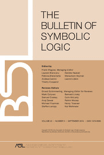
BULLETIN OF SYMBOLIC LOGIC
Fostering Intellectual Discourse in Symbolic LogicBULLETIN OF SYMBOLIC LOGIC, published by Cambridge University Press, is a distinguished academic journal that serves as an essential platform for the dissemination of research in the realms of logic and philosophy. Since its inception in 1995, this journal has progressed through its convergence years and remains committed to fostering intellectual discourse among scholars. With a 2023 ranking in the Q1 category of Philosophy and a Q3 classification in Logic, it continues to uphold its reputation as a significant contributor to the field. While operating under a traditional subscription model, the journal dedicates itself to publishing high-quality articles that explore foundational issues, advanced theories, and innovative insights in symbolic logic. Researchers, professionals, and students will find invaluable resources within its pages, particularly as it ranks favorably among peers, with noteworthy standings in Scopus rankings. For those seeking to deepen their understanding of logical frameworks and their philosophical implications, BULLETIN OF SYMBOLIC LOGIC is an indispensable resource.
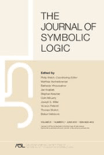
JOURNAL OF SYMBOLIC LOGIC
Illuminating the Depths of Logical InquiryThe JOURNAL OF SYMBOLIC LOGIC, published by Cambridge University Press, stands as a leading platform for scholarly discourse in the realms of logic and philosophy. With a rich history dating back to 1938, this esteemed journal is dedicated to presenting cutting-edge research that pushes the boundaries of knowledge within symbolic logic and its applications. In 2023, it proudly holds a distinguished Q1 ranking in both Logic and Philosophy categories, reflecting its high impact and relevance in the academic community. Researchers and academics benefit from its rigorous peer-review process and contributions from leading scholars worldwide, ensuring the dissemination of high-quality research and critical theories. While the journal currently does not operate under an open access model, it remains a pivotal resource for professionals seeking to deepen their understanding of logical theories and philosophical inquiries. Explore the JOURNAL OF SYMBOLIC LOGIC to engage with scholarly articles that challenge conventional thought and inspire future research.
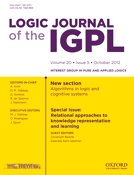
LOGIC JOURNAL OF THE IGPL
Fostering Interdisciplinary Dialogue in LogicLOGIC JOURNAL OF THE IGPL, published by Oxford University Press, stands as a prominent outlet for scholarly work in the field of logic and philosophy. With its ISSN 1367-0751 and E-ISSN 1368-9894, this journal has been a pivotal platform since its inception, covering critical developments in logical theory, methodology, and applications as well as fostering interdisciplinary dialogue with philosophical inquiries. The journal's impressive ranking in the 2023 Scopus metrics, placing it in the 76th percentile for Mathematics - Logic and categorized in Q2 in Philosophy, underscores its significant impact and relevance. Researchers, professionals, and students alike will benefit from its rich repository of innovative ideas and perspectives, with access options that afford a greater reach to the academic community as well as a commitment to advancing the field until 2024 and beyond. Whether you're exploring the nuances of formal systems or the implications of logic in philosophical contexts, the LOGIC JOURNAL OF THE IGPL offers essential insights that contribute to the ongoing discourse.
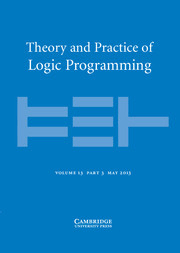
THEORY AND PRACTICE OF LOGIC PROGRAMMING
Unraveling the Complexity of Logic with Rigor and Precision.THEORY AND PRACTICE OF LOGIC PROGRAMMING, published by Cambridge University Press, is a premier academic journal that delves into the evolving field of logic programming, offering insights and advancements from 2001 to 2024. With an ISSN of 1471-0684 and an E-ISSN of 1475-3081, this journal serves as a vital resource for researchers, professionals, and students interested in areas such as artificial intelligence, computational theory, and software development. In 2023, the journal was recognized for its excellence, achieving Q1 status in Computational Theory and Mathematics and Q2 in several other categories, underscoring its significant impact within the academic community. Despite not being open access, its robust content, curated by esteemed scholars, guarantees high-quality research and innovative methodologies that are crucial for advancing the field. The journal's rigorous peer-review process and its standings in Scopus rankings further emphasize its relevance and authority, making it a quintessential platform for disseminating key findings and fostering scholarly dialogue.

ERKENNTNIS
Exploring the depths of intellectual inquiry since 1919.ERKENNTNIS, published by SPRINGER, is a premier academic journal that has been advancing the study of philosophy and logic since its inception in 1919. With its esteemed ranking in the Q1 quartile for both categories as of 2023, it stands at the forefront of scholarly discourse, earning an impressive rank of #104 in the field of philosophy and #13 in logic according to the Scopus rankings. This influential publication not only contributes to the theoretical underpinnings of these disciplines but also fosters a vibrant exchange of ideas among researchers, professionals, and students alike. While it does not offer open access to its articles, the journal's esteemed reputation and rigorous peer-review process ensure that all published works maintain the highest standards of quality and intellectual inquiry, making ERKENNTNIS an essential resource for anyone engaged in these critical areas of study.

JOURNAL OF PHILOSOPHICAL LOGIC
Challenging Minds, Shaping Philosophical DialogueThe JOURNAL OF PHILOSOPHICAL LOGIC, published by Springer, is a prestigious scholarly journal specializing in the intricate intersections of logic, philosophy, and their diverse applications. Since its inception in 1972, this eminent journal has become a cornerstone of philosophical discourse, attracting leading researchers and scholars in the field. With an impressive ranking of #77 out of 806 in the Scopus Arts and Humanities - Philosophy category and being positioned in the top 10th percentile, it stands as a Q1 journal, denoting its significant impact and rigorous standards in academic publishing. Although not an Open Access journal, it offers access to a wealth of high-quality articles contributing to the advancement of logical theory and practice until 2024. The journal aims to foster a vibrant platform for the exploration and development of philosophical logic, encouraging groundbreaking research and innovative dialogue among professionals and students alike, and solidifying its role as an essential resource within the philosophical community.